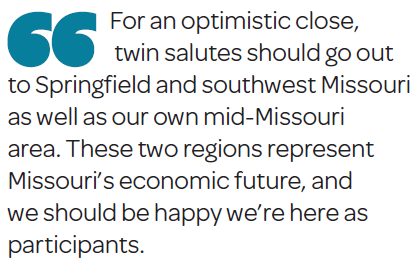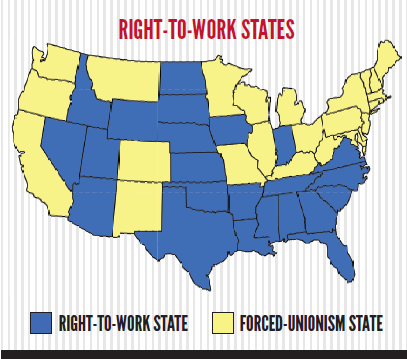Show Us New Business


SAY YOU’RE the decision-maker at a business located in Illinois. You alone — if the entity is larger, the stockholders and board of directors — are troubled by the Prairie State’s declining business climate. You’re faced with rising taxes, difficulties recruiting and retaining employees complicated in some cases by being compelled to deal with organized labor. There might be environmental matters or certain vexing, strictly local issues. If given the choice to pick up stakes and relocate, where would you move the firm?
Then there’s your business counterpart somewhere in western Missouri along the Highway 71 corridor contiguous to Kansas. Recently, our sunflower neighbors boldly reduced or eliminated a number of business and income taxes aimed at making trans-border emigration to Kansas an attractive proposition for concerns now based in Missouri. Unlike Illinois, Kansas has been a right-to-work law state since 1958, and that’s neutralized organized labor. Is Missouri doomed? Perhaps.
The economic development derby
Now that we have your attention, Missouri has its work cut out for it if the state wants to remain an active participant in the economic development derby. Sometimes it seems Missouri has just plain given up keeping pace with the rest of the country and, at the least, the eight states that border us. Have we been hampered because we have to be “shown” while areas we compete with aren’t caught up in this foolishly folksy stubbornness and just go ahead and get the job done?

In the case of Illinois-based businesses wishing to relocate, Missouri gets short shrift when stacked up against other competing states, in some cases contiguous. Take Texas for example. The Republic welcomes business from virtually everywhere because the weather is more equable, there are no personal or corporate income taxes, and with a right-to-work law in place, organized labor has virtually no power.
Kansas meanwhile has opened up an economic border war that simply must be addressed as soon as possible. Can we count on the Missouri House and Senate to address this matter during the upcoming session? Don’t county on it.

A look at right-to-work
If taxes are reduced or eliminated in one realm, substitute income streams have to be arranged to make up for those losses; historically, Missourians have never had much stomach for new taxes or any sort. It’s an economic development issue just like right-to work. Of course, organized labor hates right-to-work, and the issue failed the last time Missourians voted on it in 1978.
Still the time has come for another look at right-to-work. Put it on the ballot. Let the voters decide, and if they reject it again, well, so be it. For an optimistic close, twin salutes should go out to Springfield and southwest Missouri as well as our own mid-Missouri area. These two regions represent Missouri’s economic future, and we should be happy we’re here as participants.
Now all we need is another big announcement on the scale of IBM selecting Columbia as a new location.


